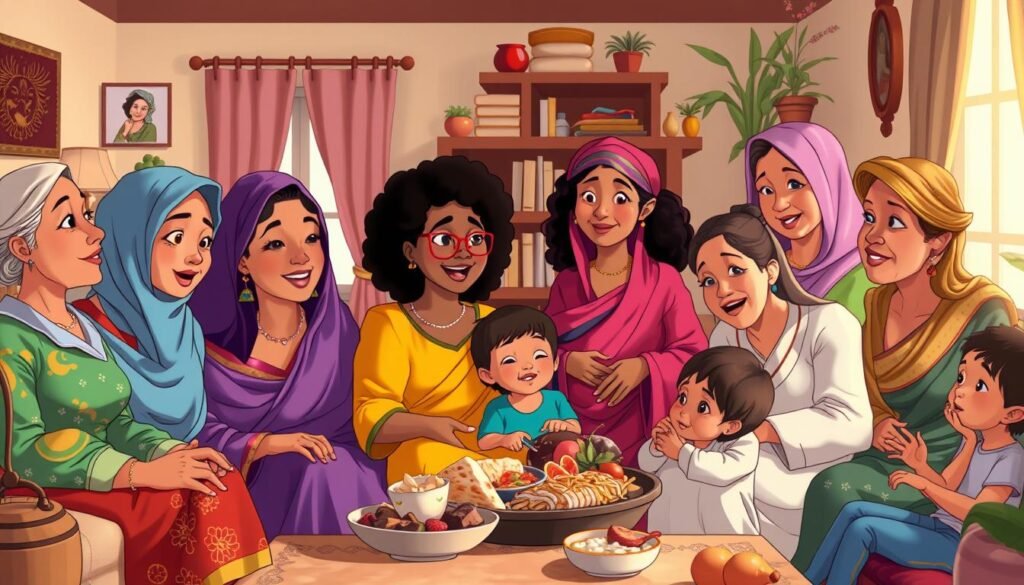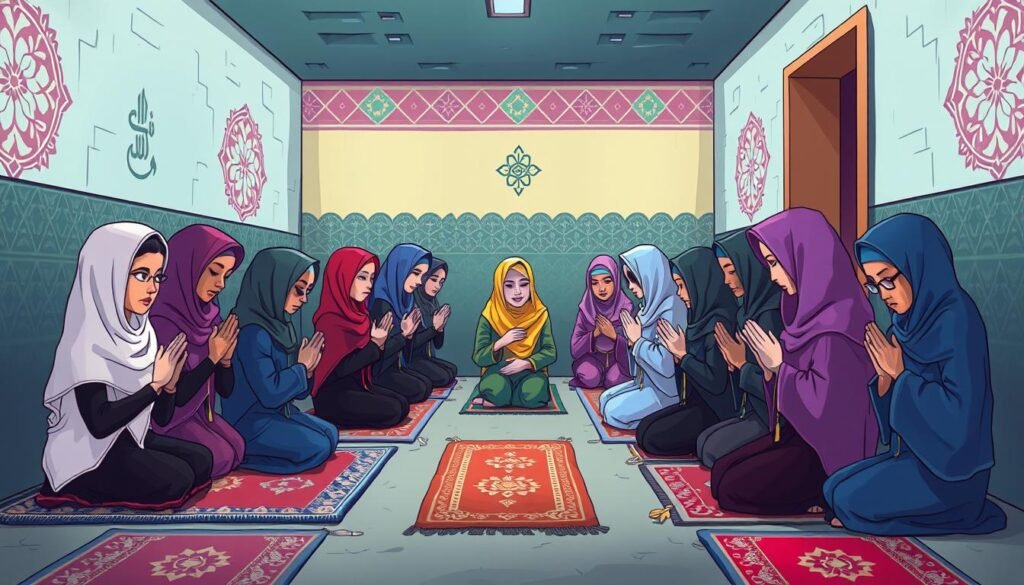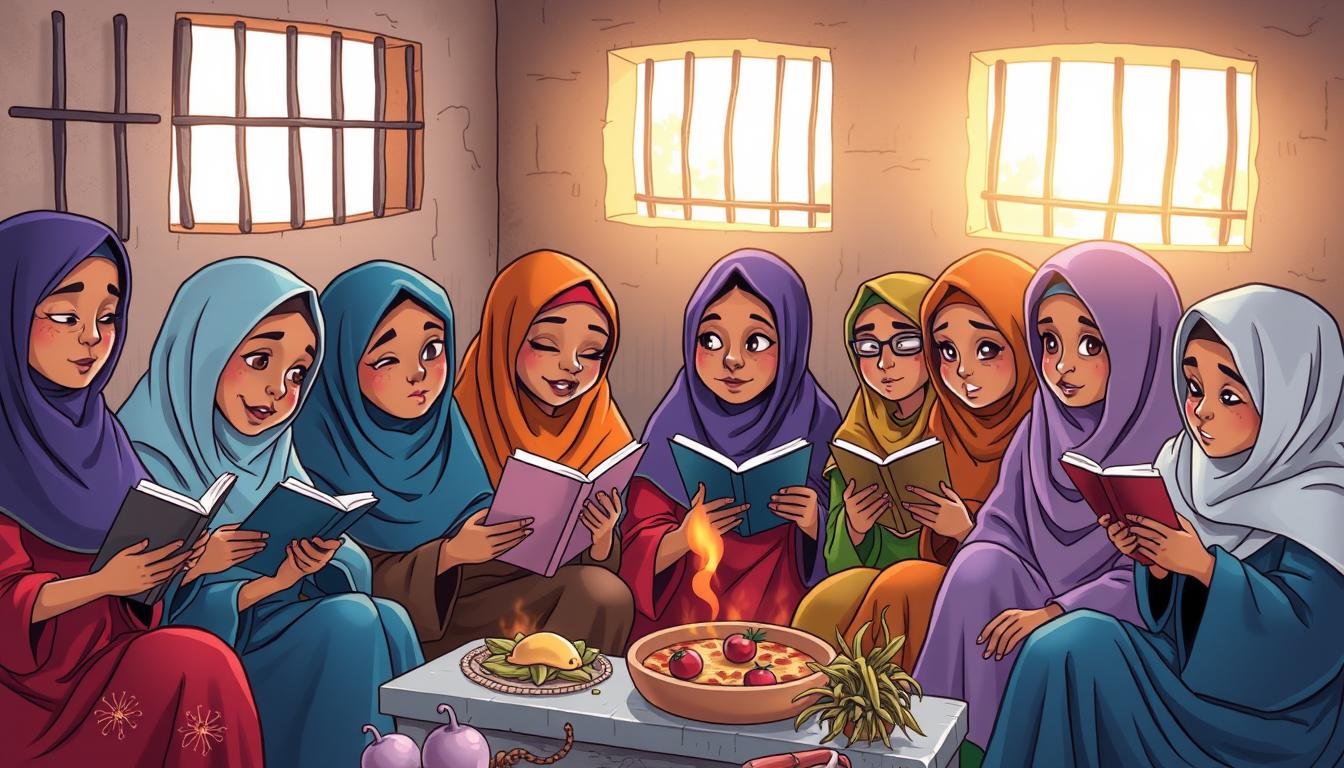Could a single Muslim character in *Orange Is The New Black* change how we see Muslims in media? Alison Abdullah’s story in the series shows us the depth of her character. Played by Amanda Stephen, Alison helps us understand a Muslim woman’s life in prison.
Her story shows us her relationships, faith, and the stereotypes she faces. This gives us a deeper look into her life and the importance of Muslim characters in TV today.
Introduction to Orange Is The New Black
Orange Is The New Black is a Netflix series that started in 2013. It got a lot of praise for its storytelling. The show dives into the lives of women in prison, focusing on Piper Chapman, played by Taylor Schilling.
The show has a big cast, like Alex Vause and Tasha “Taystee” Jefferson. It explores themes like friendship, identity, and justice. These themes hit home with many viewers.
The show is known for showing different views. The writers drew from real-life stories, even visiting a prison to get it right. This makes the characters feel real and relatable.
The show uses a prison setting to tell many stories. This setting lets us see deeper into the characters’ lives. It also lets us think about big issues in society.
Representation of Muslim Characters
Media often shows Muslim characters in a way that’s not true to their diversity. In *Orange Is The New Black*, Alison Abdullah, played by Amanda Stephen, shows us a different side. She’s the first Muslim prisoner on the show, giving us a rare look at a black Muslim woman’s life.
Amanda Stephen says Alison’s role is key. She shows us a Muslim character who’s more than just a stereotype. Alison is a devoted wife and mother, showing us that Muslim women are complex and multifaceted.
Barack Obama has said we need more diverse Muslim characters in media. Alison Abdullah is a big step in that direction. Her story helps us understand and empathize with Muslim experiences, breaking down stereotypes along the way.
The Character of Alison Abdullah
Alison Abdullah is a key character in season four of Orange Is the New Black. She is a Muslim woman facing life’s challenges in prison. Played by Amanda Stephen, she brings a unique view to the show.
Her story touches on family, society, and personal growth. These themes connect with many viewers.
Background of Alison Abdullah
Alison is a loving wife and mother. Her husband wants to bring a second wife into their home. This idea makes Alison feel jealous and insecure.
Her faith and family values are tested. The introduction of Sahara, a potential second wife, adds to the tension. Alison’s story shows the struggles of her faith and family in the show.
Cultural Context of Her Role
Alison’s story highlights her as the only Muslim inmate in Litchfield. It tackles the topic of polygamy, often misunderstood in media. Her experiences show how her Muslim identity influences her choices.
The show encourages viewers to understand these cultural aspects. Alison’s journey shows her personal struggles and broader themes in the Muslim community.
Key Themes Explored Through Alison’s Story
Alison Abdullah’s story in Orange Is the New Black touches on big themes. These include family dynamics and the emotional ups and downs of jealousy and growth.
Family Dynamics and Polygamy
Alison’s story shows us the complex family life in polygamy. At first, she thinks having a second wife will make their family better. She believes it will bring more love and understanding.
But, as time goes on, Alison faces the harsh truth. It shows how hard it can be in a polygamous family.
Jealousy and Personal Growth
Alison struggles with jealousy when her husband takes a second wife. This shows a common but deep issue in many relationships. Her feelings lead to big changes in her.
She learns to face her emotions and grow as a person. Her story teaches us about love, rivalry, and finding oneself in tough family situations.

Muslim Orange Is The New Black? Cultural Significance
Seeing Muslim characters in media is key to understanding us better. In *Orange Is The New Black*, Alison Abdullah is a standout. She wears a hijab in all 24 episodes, showing her faith.
This act of modesty is a big part of who Alison is. It shows how important OITNB is in showing Muslim life.
Alison’s story is complex, with her family adding depth. Her daughter Farah and husband Hassan show the ups and downs of life. These stories are important for everyone, not just Muslims.
They help us understand and feel for others. This is crucial for building empathy and understanding between cultures.
The show tackles big topics like racism and diversity. It makes us think about identity in a deep way. OITNB is more than just a show; it’s a place for important talks about identity, especially for Muslims.
Alison’s story makes us question our views on Islam. It shows how stories can change or confuse our understanding. Seeing characters like Alison is key to talking about Muslim representation.
To learn more about names and their meanings, check out this article on Jiya. It’s related to our look at characters like Alison in media.
The Impact of Alison’s Character on Viewers
Alison Abdullah in “Orange Is the New Black” does more than entertain. She sparks empathy and understanding among viewers. Her story, a rare glimpse into a black Muslim inmate’s life, challenges our views.
This portrayal of Muslim women makes us think about our biases. It’s a powerful way to see beyond stereotypes.
Empathy and Understanding
Alison’s complex character makes us feel her struggles deeply. It creates a strong emotional bond. Her story shows us that we all face similar challenges.
This encourages us to rethink how we see others. It’s especially important in today’s talks about racial injustices.
Confronting Stereotypes
Alison also helps us face stereotypes in media. Her portrayal as a strong, balanced character is unique. It shows the real side of Muslim women.
Amanda Stephen’s acting brings Alison’s message to life. It urges us to break down biases and celebrate diversity. Alison’s impact is felt by many, sparking important conversations about media representation.
Alison’s Relationships in the Series
In “Orange Is The New Black,” relationships are key. They shape the characters and themes. Alison Abdullah shows us family and friendship in prison.
Family Connections
Alison’s family is complex. Her life with her husband and sister-wife, Sahar, shows cultural and personal struggles. Their story shows the strength needed in tough family situations.
Despite the odds, Alison’s family moments show love in hard times. This shows her character’s depth in prison.
Friendships and Rivalries
Alison’s friendship with Black Cindy is a highlight. They start as enemies but become close friends. Their story shows how understanding can change lives.
Together, they face challenges and grow closer. Their friendship shows the power of support in hard times. It makes us think about how friends can help us grow strong.
Islamic Practices Portrayed in the Series
How Islam is shown in media matters a lot. It shapes what people think and know about the faith. In *Orange Is the New Black*, Alison shows her strong faith. She prays every day and follows her cultural rituals, even in prison.
This shows a real side of Islam, different from what many think. Media often only shows extreme views or conflict. It misses the real life of Muslims.

It’s important to see different Muslim characters in media. This helps people understand better. But, Muslims get way more media attention than others, which can lead to bad ideas.
Showing real Islamic practices is important. It respects traditions and starts a conversation about diversity in stories. Seeing characters who truly believe in their faith helps us feel more connected. It’s key for media to show the true variety of Muslim experiences.
For more on how hijabi women are shown in media, check out this article.
The Role of Hijab in Alison’s Story
The hijab is a key part of Alison Abdullah’s story. It shows her deep faith. It also shows her view of modesty and her Muslim identity.
As her story goes on, the hijab becomes more than just a piece of cloth. It becomes a symbol of her fight against society’s expectations.
Alison faces many challenges because of her hijab. Sometimes, it makes her feel strong and protected. Other times, it makes her feel trapped and judged.
This struggle is common in how Muslim women are seen in the media. It shows the different meanings of hijab in today’s world.
Alison and her friends wear hijabs to hide from enemies. This shows how the hijab can be both personal and a group symbol. But, Alison also shows her fear and vulnerability when she talks about wearing it in a tense prison.
Alison’s story shows her courage and strength. It gives us a glimpse into the life of a Muslim woman in a tough place. The hijab is more than just a piece of cloth to her. It’s a powerful statement about her faith, identity, and fight for respect.
To learn more about Alison, check out this overview. The show sparks important talks about Muslim representation in media. It helps us see the complex layers of Alison’s story.
Audience Reactions and Critique
Audience reactions to OITNB are mixed, especially among Muslim viewers. They see pride in seeing their experiences on screen. But, they also question how Muslim identities are shown.
This mix of feelings shows a deep conversation about identity and stories. It’s not just yes or no, but a rich discussion.
Impact on Muslim Viewers
Many Muslim viewers connect with Alison’s story. They see parts of their lives in her. But, they also worry if she truly represents them.
This shows a big desire for real stories in media. People want to see themselves in what they watch.
Criticism and Praise for Authenticity
Viewers have both good and bad things to say about the show. Alison’s story is seen as real, but some feel it’s not fully Muslim. The show tries to show the truth but might make things too simple.
This debate is important. It pushes for more diverse stories in TV and movies.
Lessons Learned from Alison’s Journey
Alison’s story in the series teaches us a lot. It shows us the power of identity, resilience, and acceptance. These lessons remind us that growth comes from facing challenges.
Her journey helps us understand different lifestyles and identities. Alison’s struggles teach us to be more open and understanding. Her story shows us that learning and empathy can grow in tough times.
Watching Alison’s story, we see ourselves in her experiences. We learn that forgiveness and resilience are key to growing. These lessons encourage us to connect with others and find ourselves.
Future of Muslim Representation in Media
The future of Muslim characters in media looks both promising and challenging. Alison Abdullah’s role in *Orange Is The New Black* shows a chance to move away from old stereotypes. We can start to see real stories that show the variety in Muslim communities.
The media world is slowly changing. But, we still face old problems. These problems make Muslims seem bad, often because of misunderstandings or extremism.
It’s key for Muslim creators to tell their stories. They should be main voices, not just extras. The Beyond Resilience series shows we’re working to include more diverse stories. But, we need to keep pushing, especially against censorship and negative political views.
Media can really change how we see things. It helps us understand each other better. This is very important.
With Netflix and Hulu, we have a chance to show more complex stories. These stories should reflect the real lives of Muslims. By working together, we can make media that truly represents everyone.
FAQ
What does *Orange Is The New Black* portray about Muslim representation?
Who is Alison Abdullah and what is her significance in the series?
How does *Orange Is The New Black* handle stereotypes related to Muslim characters?
What themes are explored through Alison’s character?
How does Alison’s Muslim faith influence her character development?
What impact does Alison’s character have on viewers, particularly Muslim audiences?
In what ways does *Orange Is The New Black* challenge traditional representations of Muslim women?
What role does the hijab play in Alison’s narrative?
How can Alison’s journey provide lessons for viewers about personal growth?
What challenges and opportunities lie ahead for Muslim representation in media?

Embracing Faith, One Insight at a Time!
The teachings of the Quran have always guided my path. With a deep passion for Islamic knowledge, I strive to blend the wisdom of tradition with the relevance of today, making the timeless messages of Islam accessible and meaningful for everyone.
Muslim Culture Hub is my platform to share historical insights and thought-provoking articles, exploring both well-known and lesser-discussed aspects of Islamic culture and beliefs. My mission is to create an inclusive online space where everyone can learn, strengthen their faith, and connect with the profound message of Islam.
Join the journey!
May peace be upon you.








